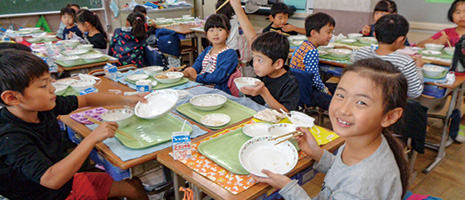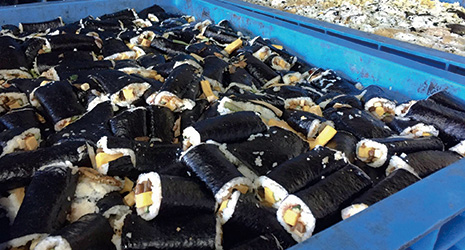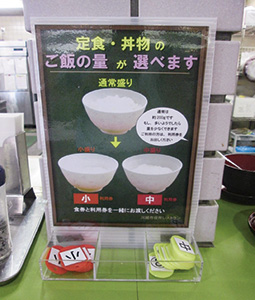Home > Highlighting JAPAN > Highlighting Japan November 2019 > Policy-Related News
Highlighting JAPAN


Promoting Reduction of Food Loss and Waste
Japan is undertaking a wide range of measures to reduce its food loss.
As can be seen from Goal 12 of the targets of the 2030 Agenda for Sustainable Development, which was adopted by the United Nations General Assembly in September 2015, reduction of food loss and waste is one of the most important international challenges today.
Japan is estimated to have an annual food loss of six million tons or more. With many people around the world suffering from nutritional deficiencies, reducing food loss is an issue that Japan, which depends on imports from overseas for many of its foods, needs to address in earnest.
In Japan, the Act on Promotion of Food Loss and Waste Reduction came into force on October 1, 2019. This law defines reduction of food loss as a social measure for preventing still-edible foods from being discarded. It was enacted to encourage all Japanese people to tackle the issue independently in an effort to promote food loss reduction as a national movement.
According to a consumers’ attitude survey conducted by the Consumer Affairs Agency in 2018, public recognition of the food loss issue is 74.5%. In response to the question, “In which dietary setting are you particularly conscious of food waste?,” 55.7% of respondents noted a setting in which they discard food that is past its expiration date without eating it, 48.7% noted a setting in which they see others’ leftovers at restaurants, 37.5% noted a setting in which they see their own or their families’ leftovers, and 21.5% noted a setting in which they throw away waste (kitchen waste in particular).
In response to the question, “What can you do to help reduce food loss?,” 60.7% of respondents, the largest number, answered, “Eat up all of the food.” Some 40% or more answered, “Preserve food by freezing,” “Avoid cooking too much food” and “Avoid throwing away food that is past its expiration date right away, and decide whether the food is still edible by one’s own determination.” Other answers also included not ordering too much food at restaurants and remaking leftovers into other dishes. The Consumer Affairs Agency has established “The Kitchen of the Consumer Affairs Agency” on Cookpad, a cooking recipe website, to introduce recipes that are free from food waste.
In the food distribution industry, food products are returned or disposed of due to business practices such as manufacturers’ delivery deadlines fixed by retailers and the fixing of stores’ sales deadlines, which leads to food loss. In response to this situation, some companies take measures for improvement, such as relaxing delivery deadlines and extending expiration dates with quality preservation technologies. In addition, progress is also being made in the development of containers and packaging that are useful for reducing food loss by making use of advanced technologies, such as containers that are able to control food degradation after their packages have been opened and prolong the freshness maintenance period, packaging that is able to increase the barrier performance of oxygen and steam so that food can be kept for a long time, or containers and packaging the correct size for using up or eating up food.
Restaurants and hotels encourage customers to order an appropriate amount of food, offer a service that allows customers to take their leftovers home, and provide the option of smaller portions on the menu. Retail stores sell products divided into small portions and urge customers to purchase goods from the front of the product shelves (products whose sales deadlines are close).
Matsumoto City, Nagano Prefecture, is promoting the “Let’s Eat Up Everything! 30/10 Campaign,” which is intended to reduce leftovers by encouraging people to remain seated and enjoy eating for 30 minutes after a toast and ten minutes before the end at dinner and drinking parties, and the city also recognizes restaurants and companies that encourage food loss reduction as official members of the campaign. Similar movements to the 30/10 Campaign are spreading nationwide.
Fukui Prefecture implemented the “Delicious Fukui Eat Up Everything Campaign,” a campaign for cooking and eating an appropriate amount of delicious food using fresh ingredients, ahead of all other prefectures in Japan. In 2016, Fukui Prefecture appealed to other local governments to participate in its network, resulting in the establishment of the “Nationwide Delicious Eat-Up Campaign Network Council.” With sharing and distribution of information and the nationwide collaborative campaign being the pillar of activity, the area of activity had expanded so extensively that 408 local governments are participating in the network (as of October 10, 2019).
A demonstrative project for reducing household food loss by the Consumer Affairs Agency in Tokushima Prefecture found that the amount of food loss had been reduced by about 20% by undertaking measurements of food loss in homes, and that the amount of food loss had been reduced by about 40% by making efforts to reduce it as well as measurements. These findings can be considered to show that the project participants noticed how much food loss they were generating by measuring its amount and that they later improved their actions. Based on these results, the Consumer Affairs Agency produced awareness-raising materials and has used these materials to promote measures for reducing household food loss.
© 2009 Cabinet Office, Government of Japan








